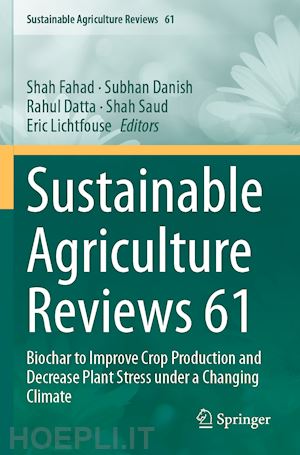
Questo prodotto usufruisce delle SPEDIZIONI GRATIS
selezionando l'opzione Corriere Veloce in fase di ordine.
Pagabile anche con Carta della cultura giovani e del merito, 18App Bonus Cultura e Carta del Docente
The book aim to contribute the latest understandings of physiological, biochemical and molecular bases of the responses of major crop plants to a range of different biomass produced biochar to introduce climate resilience crop varieties which leads to enhanced crop productivity and quality under stressful conditions and also for better utilization of natural resources to ensure food security through modern breeding. Finally, this book will be a valuable resource for future plant stress related research with biochar, and can be considered as a reference book for front-line researchers working on sustaining crop production under climate change.
Adverse effects of climate changes on crops has developed the situation quite critical for sustainable agriculture. Food security has become in danger due to low production of agricultural crops by resilient climate and ever increasing human population. Heat, drought, salinity, soil compaction, flooding and poor soil organic carbon induced stress in crops by climate adverse conditions are major concerns in this regard. A mechanistic understanding of the interactions between abiotic stresses response of crops is needed to identify and take advantage of acclimation traits in major crop species as a prerequisite for securing robust yield and good quality. This underpins a need for crops with inherent yield increase, yield stability against multiple abiotic stresses and improved quality. Individual stress tolerance mechanisms have been well documented so far. However, mechanisms behind plants’ tolerance by application of biochar and its interactions with soil and plant roots towards multiple abiotic stresses are not fully understood.
In addition, there will always be some uncertainty associated with modelling the complex relationships between agricultural yields, product quality with biochar under future climate scenarios. Prediction of yield and quality stability, one of mostcomplex agronomic traits, must integrate aspects of plant development, physiology, biochemistry and genetics. Furthermore, the GxExM interactions will complicate the model predications, thus the responses of a given genotype to a defined environment under certain management strategy need to be determined empirically and used to parameterise and refine crop models.
Dr. Subhan Danish has completed a PhD in Agriculture Soil Science from the Bahauddin Zakariya University in Pakistan. His has expertise in soil microbiology, phytoremediation of heavy metals, biochar use as an amendment and plant nutrition. He has published 72 research articles. He is guest editor of the Sustainability Journal. He got a Gold Medal in M.Sc. Hons. and was awarded Role of Honor for Best Debater at provincial level and interdepartmental university level.
Dr. Rahul Datta is a soil microbiologist and enzymologist holding an MSc and PhD from the Department of Geology and Pedology at Mendel University in Brno, Czech Republic, where he is currently a researcher. He has acquired global experience in soil science research by working at the Ohio State University, USA, and at the University of Florence, Italy. He has published numerous research articles and a book. He is editorial board member of the Journal of Open Agriculture.
Dr. Shah Saud received his Ph.D. and post doctorate in turf grasses, horticulture, from the Northeast Agricultural University, Harbin, China. He is currently working as Assistant Professor in the College of Life Science, Linyi University, China. He has published over 200 articles, edited 8 books and written 60 book chapters plant physiology, plant stress responses, and environmental problems in relation to agricultural plants.
Dr. Eric Lichtfouse is Professor at Xi'an Jiaotong University, China, and Chief Editor founder of thejournal Environmental Chemistry Letters and the series Sustainable Agriculture Reviews. He has invented carbon-13 dating, a method allowing to measure the relative age of organic molecules in complex media, and has discovered temporal pools of individual substances in soils. He has written about 400 publications and has awards in analytical chemistry and scientific editing. He is teaching scientific writing and communication, and has written the book Scientific Writing for Impact Factor Journals. He is XTerra Vice-Champion in his age category.











Il sito utilizza cookie ed altri strumenti di tracciamento che raccolgono informazioni dal dispositivo dell’utente. Oltre ai cookie tecnici ed analitici aggregati, strettamente necessari per il funzionamento di questo sito web, previo consenso dell’utente possono essere installati cookie di profilazione e marketing e cookie dei social media. Cliccando su “Accetto tutti i cookie” saranno attivate tutte le categorie di cookie. Per accettare solo deterninate categorie di cookie, cliccare invece su “Impostazioni cookie”. Chiudendo il banner o continuando a navigare saranno installati solo cookie tecnici. Per maggiori dettagli, consultare la Cookie Policy.